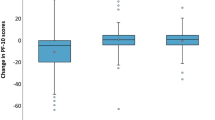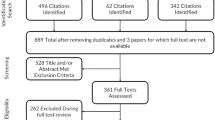Abstract
Postoperative fatigue as defined by a 10-point scale (1=fit, 10=fatigued) was determined prospectively in 84 patients undergoing major surgery. Results from this scale correlated well with standard psychological assessment of fatigue (Profile of Mood States Questionnaire) (bir=0.767;bip<0.0001). Fatigue values were 3.46±0.19 arbitrary units (mean±SEM) preoperatively; and postoperatively they were 5.61±0.24 at day 7, 5.02±0.24 at day 14, 3.74±0.19 at day 28, and 2.77±0.18 at day 90. Fatigue during the postoperative period was integrated to give a total fatigue score (332±14 arbitrary units, range 90–664), and this score was correlated with preoperative and early postoperative factors. The best predictor of postoperative fatigue was preoperative fatigue (bir=0.545;bip=0.001), with lesser correlations with diagnosis (especially cancer); preoperative weight, particularly total body protein (bir=0.317;bip=0.01); and weight loss (bir=0.29;bip=0.03), grip strength (bir=0.352;bip=0.01), and age (bir=0.267;bip=0.01). Postoperative fatigue was not correlated with preoperative anxiety, depression, or hostility, involuntary muscle function, gender, preoperative stress, or changes in total body protein or fat over the two postoperative weeks. It is concluded that patients who present for surgery already fatigued are the ones who are most likely to suffer from prolonged postoperative fatigue, particularly so if they are elderly, suffer from cancer, or have few extra reserves of body protein.
Résumé
L'asthénie post-opératoire a été determinée de façon prospective chez 84 patients ayant eu un acte chirugical majeur, en utilisant un score comportant 10 échelons (1=en forme, 10=asthénie franche). Les résultats de ce questionnaire étaient bien corrélés avec les tests psychologiques standard d'évaluation de l'asthénie (questionnaire d'évaluation de l'humeur) (bir=0.767;bip < 0.001). L'asthénie a été chiffrée, en unités arbitraires (valeur moyenne±écart-type de la moyenne) à 3.46±0.19 en pré-opératoire, et en post-opératoire à 5.61±0.24 à J+7, 5.02±0.24 à J+14, 3.74±0.19 O J+28, et 2.77±0.18 à J+90. Les estimations de l'asthénie durant la période post-opératoire ont été intégrées pour donner un score d'asthénie globale (332±14 unités arbitraires, extrêmes: 90–664) qui a été corrélé aux facteurs pré-opératoires et post-opératoires précoces. Le meilleur facteur prédictif de la survenue d'une asthénie post-opératoire était l'existence d'une asthénie pré-opératoire (bir=0.545;bip=0.001), les autres facteurs prédictifs étant le diagnostic (particulièrement celui de cancer), le poids préopératoire, et plus particulièrement le taux de protéine corporelle total (bir=0.317;bip=0.01), et la perte de poids (bir=0.29;bip=0.03), la force de préhension (bir=0.352;bip=0.01), et l'âge (bir=0.267;p=0.01). L'asthénie post-opératoire n'était pas corrélée à l'anxiété pré-opératoire, la dépression ou l'aggressivité, la fonction des muscles lisses, le sexe, le stress pré-opératoire, ou les modifications du taux de protéine et de lipide corporels totaux durant les deux semaines post-opératoires. En conclusion ce sont les patients qui sont déjà fatigués au moment de l'intervention qui se plaignent le plus souvent d'une asthénie post-opératoire prolongée. Ceci est particulièrement vrai chez les patients âgés, ou qui ont un cancer, et qui ont de faibles réserves de protéines corporelles.
Resumen
La fatiga postoperatoria según una escala de 10 puntos (1 = sin fatiga, 10=fatigado) fue determinada prospectivamente en 84 paciente sometidos a cirugía mayor; los resultados de la utilización de esta escala se correlacionan bien con la valoración psicológica estándar de la fatiga (Cuestionario de Perfil de los Estados Emocionales) (bir=0.767;bip<0.0001). Los valores de fatiga fueron de 3.46±0.19 unidades arbitrarias preoperatoriamente, 5.61±0.24 en el día 28 y 2.77±0.18 en el día 90 del periodo postoperatorio. La fatiga del periodo postoperatorio fue integrada para dar un puntaje total de fatiga (332±14 unidades arbitrarias, rango: 90–664), y éste fue correlacionado con los factores preoperatorios y postoperatorios precoces. El mejor factor de predicción de fatiga postoperatoria fue la fatiga preoperatoria (bir=0.545;bip=0.001), con menores correlaciones con el diagnóstico (especialmente cáncer), el peso preoperatorio, la proteína corporal total en particular (bir=0.317;bip=0.01) y la pérdidea de peso (bir=0.29;bip=0.03), la fuerza del apretón de manos (bir=0.352;bip=0.01) y la edad (bir=0.267; p=0.01). La fatiga postoperatoria no se correlacionó con la ansiedad preoperatoria, la depresión o la hostilidad, la función muscular involuntaria, el sexo, el estrés preoperatorio o los cambios en la proteína corporal total o la grasa corporal en las dos semanas postoperatorias. Se llega a la conclusión que los pacientes que se presentan a cirugía ya fatigados son los que más probablemente habrán de sufrir fatiga postoperatoria prolongada. Esto aparece particularmente cierto si son de edad avanzada, o tienen cáncer o poseen escasas reservas de proteína corporal.
Similar content being viewed by others
References
Christensen, T., Wulff, Ch., Fuglsang-Frederiksen, A., Kehlet, H.: Electrical activity and arm muscle force in postoperative fatigue. Acta Chir. Scand.151:1, 1985
Christensen, T., Bendix, T., Kehlet, H.: Fatigue and cardiorespiratory function following abdominal surgery. Br. J. Surg.69:417, 1982
Edwards, H., Rose, E.A., King, T.C.: Postoperative deterioration in muscle function. Arch. Surg.117:899, 1982
Newham, D.J., Harrison, R.A., Clark, C.G.: The effect of major abdominal surgery on skeletal muscle function. Br. J. Surg.73:1028, 1986
Toner, C.C., Sutton, G.L.J., Karran, S.J.: Postoperative fatigue. Br. J. Surg.73:502, 1986
Schroeder, D., Hill, G.L.: Postoperative fatigue-mind or muscle [abstract]. Aust. N.Z. J. Surg. 1988
Christensen, T., Hougård, F., Kehlet, H.: Influence of pre- and intraoperative factors on the occurrence of postoperative fatigue. Br. J. Surg.72:63, 1985
Merton, P.A.: Voluntary strength and fatigue. J. Physiol. (Lond.)123:553, 1954
Edwards, R.H.T., Young, A., Hosking, G.P., Jones, D.A.: Human skeletal muscle function; description of tests and normal values. Clin. Sci. Mol. Med.52:283, 1977
Greig, P.D., Jeejeebhoy, K.N.: Muscle function testing in the hospitalised patient: implications for starvation and refeeding. IEEE Eng. Med. Biol. MagazineJune:36, 1986
Beddoe, A.H., Streat, S.J., Hill, G.L.: Evaluation of an in vivo prompt gamma neutron activation facility for body composition studies in critically ill intensive care patients: results in 41 normals. Metabolism33:270, 1984
MacFie, J., Burkinshaw, L., Oxby, C., Holmfield, J.H., Hill, G.L.: The effect of GI malignancy on resting metabolic expenditure. Br. J. Surg.69:443, 1982
Young, G.A., Hill, G.L.: A controlled study of protein-sparing therapy after excision of the rectum. Ann. Surg.192:183, 1980
Christensen, T., Kehlet, H.: Postoperative fatigue and changes in nutritional status. Br. J. Surg.71:473, 1984
Christensen, T., Hjortsø, N.C., Mortensen, E., Rils-Hansen, M., Kehlet, H.: Fatigue and anxiety in surgical patients. Acta Psychiatr. Scand.73:76, 1986
Author information
Authors and Affiliations
Rights and permissions
About this article
Cite this article
Schroeder, D., Hill, G.L. Predicting postoperative fatigue: Importance of preoperative factors. World J. Surg. 17, 226–231 (1993). https://doi.org/10.1007/BF01658931
Issue Date:
DOI: https://doi.org/10.1007/BF01658931




